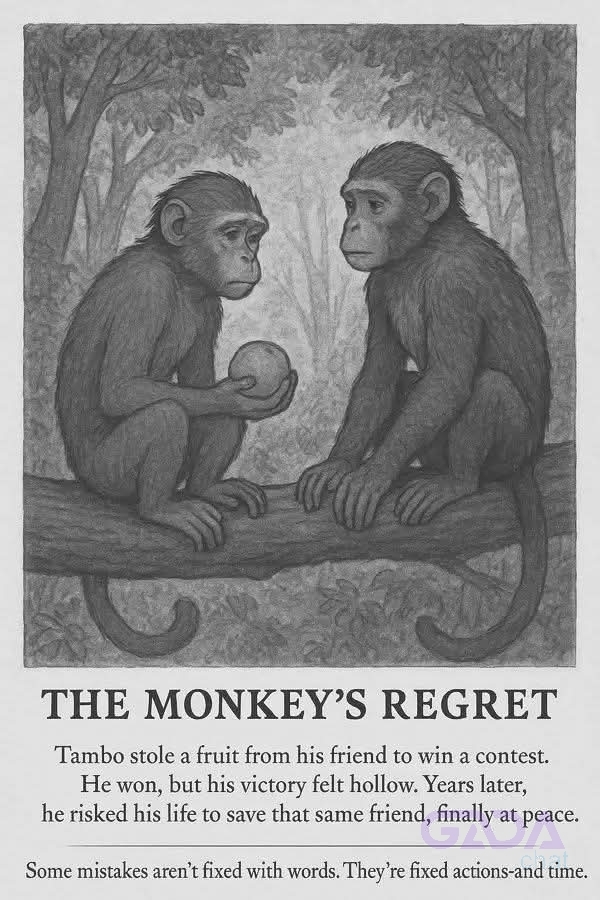⸻
The Monkey’s Regret
Tambo and Zubi had been friends for as long as either of them could remember. They were born in the same fig tree, played on the same vines, and grew up in the same stretch of the forest. Tambo was lively and restless, always eager to prove himself. Zubi was quieter, the kind of friend who listened more than he spoke, but when he spoke, it mattered.
One dry season, the elders of the forest announced a special event—a Fruit Gathering Day, where every animal was invited to bring the finest fruit they could find. It wasn’t a competition in name, but everyone knew it was. The best fruit would be praised, and whoever brought it would enjoy a bit of respect and admiration.
Tambo, never one to miss a chance to shine, threw himself into the task. But the drought had dried many of the usual fruit trees, and all he could find were half-ripe bananas and overripe guavas. Meanwhile, Zubi quietly climbed a remote tree by the stream and returned with a fruit neither of them had seen in weeks—a smooth, ripe plum, deep red and firm.
Tambo couldn’t stop looking at it.
The night before the gathering, he stayed awake turning the thought over in his head. “Zubi doesn’t even care for these things. He’s not interested in being praised. I could just take it for tomorrow… and return it after the gathering. It’s only one fruit.”
And so, he did.
Zubi was confused the next morning when he couldn’t find the plum. But he didn’t say much, just looked around for a while, then carried his bananas to the gathering.
Tambo presented the plum. Animals admired it. A few nodded their approval. The elders complimented him on the find. It wasn’t a grand victory, just quiet recognition. But Tambo couldn’t enjoy it.
When he looked at Zubi across the clearing, his friend’s face was calm—but distant. They walked home in silence.
Days passed. The easy laughter between them faded. Zubi still greeted him, still shared food, still offered help when needed—but something unspoken had settled between them, and Tambo felt it with every word that didn’t come.
He thought about returning the fruit, or confessing. But what would that change?
Months went by.
Then, during the next rainy season, the riverbanks overflowed. One morning, word came that Zubi had gone to help a stranded animal near the flooded stream and hadn’t returned.
Tambo ran without thinking. When he reached the edge of the swollen water, he saw Zubi holding onto a branch, stuck in thick mud, water rising fast. There were no crowds, no drama—just two friends in trouble.
Tambo found a long stick, waded into the edge of the water, and held it out. He slipped once but kept his grip. With effort and a quiet word of encouragement, he helped Zubi back to dry land.
No one cheered. There were no dramatic rescues or grand gestures. Just two monkeys sitting on wet ground, breathing hard, side by side again.
As they rested under a tree, Tambo finally said, “It was me. I took the plum that day. I thought it was just fruit, but I knew what it meant.”
Zubi looked at him for a long time before replying. “I knew,” he said simply. “But I also knew you’d come back.”
They didn’t talk about it again. But over time, the silence between them changed. Not quite like before, but honest, and steady.
Tambo never sought admiration again. What mattered most, he had nearly lost. And quietly, without words, he began to rebuild what truly mattered.
⸻
Moral: Some mistakes aren’t fixed with words. They’re fixed with actions—and time.
⸻
⸻
The Monkey’s Regret
Tambo and Zubi had been friends for as long as either of them could remember. They were born in the same fig tree, played on the same vines, and grew up in the same stretch of the forest. Tambo was lively and restless, always eager to prove himself. Zubi was quieter, the kind of friend who listened more than he spoke, but when he spoke, it mattered.
One dry season, the elders of the forest announced a special event—a Fruit Gathering Day, where every animal was invited to bring the finest fruit they could find. It wasn’t a competition in name, but everyone knew it was. The best fruit would be praised, and whoever brought it would enjoy a bit of respect and admiration.
Tambo, never one to miss a chance to shine, threw himself into the task. But the drought had dried many of the usual fruit trees, and all he could find were half-ripe bananas and overripe guavas. Meanwhile, Zubi quietly climbed a remote tree by the stream and returned with a fruit neither of them had seen in weeks—a smooth, ripe plum, deep red and firm.
Tambo couldn’t stop looking at it.
The night before the gathering, he stayed awake turning the thought over in his head. “Zubi doesn’t even care for these things. He’s not interested in being praised. I could just take it for tomorrow… and return it after the gathering. It’s only one fruit.”
And so, he did.
Zubi was confused the next morning when he couldn’t find the plum. But he didn’t say much, just looked around for a while, then carried his bananas to the gathering.
Tambo presented the plum. Animals admired it. A few nodded their approval. The elders complimented him on the find. It wasn’t a grand victory, just quiet recognition. But Tambo couldn’t enjoy it.
When he looked at Zubi across the clearing, his friend’s face was calm—but distant. They walked home in silence.
Days passed. The easy laughter between them faded. Zubi still greeted him, still shared food, still offered help when needed—but something unspoken had settled between them, and Tambo felt it with every word that didn’t come.
He thought about returning the fruit, or confessing. But what would that change?
Months went by.
Then, during the next rainy season, the riverbanks overflowed. One morning, word came that Zubi had gone to help a stranded animal near the flooded stream and hadn’t returned.
Tambo ran without thinking. When he reached the edge of the swollen water, he saw Zubi holding onto a branch, stuck in thick mud, water rising fast. There were no crowds, no drama—just two friends in trouble.
Tambo found a long stick, waded into the edge of the water, and held it out. He slipped once but kept his grip. With effort and a quiet word of encouragement, he helped Zubi back to dry land.
No one cheered. There were no dramatic rescues or grand gestures. Just two monkeys sitting on wet ground, breathing hard, side by side again.
As they rested under a tree, Tambo finally said, “It was me. I took the plum that day. I thought it was just fruit, but I knew what it meant.”
Zubi looked at him for a long time before replying. “I knew,” he said simply. “But I also knew you’d come back.”
They didn’t talk about it again. But over time, the silence between them changed. Not quite like before, but honest, and steady.
Tambo never sought admiration again. What mattered most, he had nearly lost. And quietly, without words, he began to rebuild what truly mattered.
⸻
Moral: Some mistakes aren’t fixed with words. They’re fixed with actions—and time.
⸻








